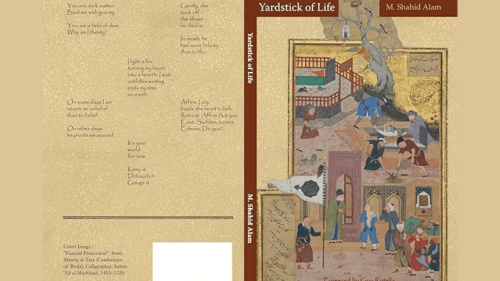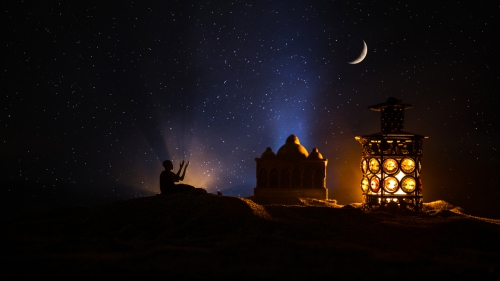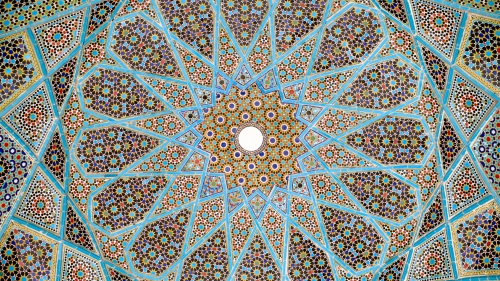Why Do People Overlook Quran's Miracles?

Summary: This article is about the Qur'an as an everlasting miracle. It explains how understanding of the Qur'an can be optimized as such and how to avoid common pitfalls. The article concludes that one must deal wisely and methodically with the Qur'an, conforming to its objectives (maqasid). Substance and quality are not to be exchanged for superficiality and sheer quantity. This is so because such is the nature of the Qur'an that it gives only as much as people genuinely want and are ready to receive from it.
The Holy Qur'an is an eternal miracle sent by the Creator of the universe through His final Messenger to humankind. It is the greatest miracle, and best heavenly gift ever witnessed on earth. Its importance is proportionate to the greatness of Prophet Muhammad (peace and blessings be upon him) as the Seal of prophets and the greatness of his prophet-hood mission.
The Qur'an is Allah's final testament to humanity. It is His Holy Speech, and so, the only remaining undeviating connection with Heaven. For that to remain so, Allah vows that He will be the Qur'an's Guardian against any even slightest form of interpolation or distortion.
As Allah's infinite Speech, the Qur'an is not what people say or think it is. It is what only Allah declares it is. Thus, the Qur'an is guidance, book, clear proofs of the guidance, a criterion, judgment between right and wrong, glad tidings, good advice, reminder, truth, healing for what is in the breasts, a mercy, clarification for all things, a light, inspiration, spirit, enlightenment, and clear insight.
To what extent the Qur'an can impact not only human life but also life in general, testifies the following Qur'anic assertion: "If We had sent down this Qur'an upon a mountain, you would have seen it humbled and coming apart from fear of Allah. And these examples We present to the people that perhaps they will give thought" (al-Hashr, 21).
The Prophet was asked to utilize the potentials of the Qur'an to the fullest and to "strive against them with the Qur'an a mighty striving (with a great endeavor)" (al-Furqan, 52). The Qur'an was the Prophet's best ally, his safest haven, and his most potent weapon (defense).
The revelation of the Qur'an was the most unusual event in the history of creation. The whole of existence might have been perceived to culminate with that very occurrence. Everything might have been directed towards that spiritual and experiential climax.
Thus, during the revelation of the Qur'an, the entire metaphysical life was affected. Some of its aspects were yet momentarily adjusted and were brought to a standstill. The revelation was an existential threat and rapture. It was the most important reason for the "existence" of existence.
Accordingly, for instance, the night in which the Qur'an was revealed (when the revelation to the Prophet started) is called the Night of Qadr (decree, power, value, destiny, or measures). It is better than a thousand months. "The angels and the Spirit descend therein by permission of their Lord for every matter. Peace it is until the emergence of dawn" (al-Qadr, 4-5).
Parenthetically, according to some pseudo-Sufi doctrines, Prophet Muhammad (peace and blessings be upon him) was the first to be created, the first to be mentioned, and the first to be honored. This applies to the Prophet's personality, his mission, and his complete life. Many Sufis believe – on account of some weak and fabricated traditions, though - that Allah said to the Prophet: "O Muhammad, without you I would not have created anything, then or now… I have created everything through you (that is, the light of Muhammad which was around as the light of Islam since the commencement of life in the world of souls)."
The Qur'an gives as much as people want to receive
The Qur'an is bigger and more profound a miracle than the famous miracles of prophet Musa (Moses) - such as his staff turning into a serpent, his hand becoming white and shining brightly, his parting of the sea, etc. - and prophet 'Isa (Jesus) – such as speaking from the cradle, healing the blind and the leper, resurrecting the dead, receiving from heaven a table laden with food, etc. The same can be said about the numerous miracles of all the other prophets as well.
Those miracles were short-lived. As massive as it was, their impact was confined only to a group of people, a moment in time, and to a particular geographical milieu. Afterward, they became mere historical narrations.
As the faith of those prophets' peoples gradually weakened, and their trustworthiness regarding the custody of and adherence to the prophets' religious traditions became more and more questionable, the narrations were correspondingly losing their appeal and significance. Historical facts thus, in the end, became legends; legends became myths, and myths in the modern age of agnosticism morphed into mere folktales and fibs. The Qur'an and Muslims became the best guardians of such miracles and their authenticity, as well as of the honorable reputations of their prophets.
On the other hand, the Qur'an is a miracle for all times, all people, all places, and all situations. The matter, nevertheless, is not as simple and straightforward as it seems.
The Qur'an is both self-revealing and explorable a capacity. It is at once a manifest and hidden treasure. It is as much a means as an end. In equal measure, it leads to absolute Truth and by being an integral part of the former. It speaks and wants to be "spoken or communicated to," in the sense that it wants to forge reciprocal relationships with its readers (reciters).
Allah says thus: "And We have indeed made the Qur'an easy to understand and remember: then is there any that will receive admonition?" (al-Qamar, 17).
"And We have also sent down unto you (O Muhammad) the reminder and the advice (the Qur'an), that you may explain clearly to people what is sent down to them, and that they may give thought" (al-Nahl, 44).
"These are the verses of the clear Book. We have sent it down as an Arabic Qur'an, in order that you may learn wisdom" (Yusuf, 1-2).
"(It is) a Book We have revealed to you abounding in good that they may ponder over its verses and that those endowed with understanding may be mindful" (Sad, 29).
"Do they not then earnestly seek to understand the Qur'an, or are their hearts locked up (from understanding it)?" (Muhammad, 24).
As part of its being a miracle, the Qur'an gives only as much as a person wants and as much as a person is ready to receive from it. Hence, there are people who befriend, study, and constantly recite the Qur'an, but receive nothing or very little from it. In contrast, there are people whose contacts with the message of the Qur'an were minimal, yet their lives became transformed thereby.
This is the case because, in the first scenario, people wanted nothing or very little from the Qur'an. Their relationship with it was perhaps just academic, professional, insincere, and loaded with vested interests. Whereas in the second scenario, people were genuine truth-seekers, and the Qur'an as a source and embodiment of truth immediately enthralled them. This bears a resemblance to an encounter between the lost, desperate, and thirsty souls and the revelation as a savior meant to seek and save such as have become lost, afraid and thirsty.
It is natural that the Qur'an does not give more than wanted and asked from it because it would be unwarranted to do so. It is fair that people get only what and how much they want and deserve.
Nor does the Qur'an give more than a person is ready for because the bequest might be unappreciated. It may be too much of a load to bear, and so, it may be misunderstood and mishandled. A person may also seek discord, thereby seeking only privately reasonable interpretations (Alu' Imran, 7). Indeed, the Qur'an "guides to that which is most right and most just" (al-Isra, 9).
"And say: "The truth is from your Lord, so whomever wills - let him believe; and whoever wills - let him disbelieve" (al-Kahf, 29).
"Indeed, Allah guides not the wrongdoing people" (al-Ma'idah, 51).
"Indeed, Allah does not guide the disbelieving people" (al-Ma'idah, 67).
"Allah does not guide the defiantly disobedient people" (al-Ma'idah, 108).
Dealing wisely with the Qur'an
The Qur'an reiterates that it is guidance. Such is perhaps its most prominent epithet. However, the Qur'an concurrently brings to light that its guidance is not monolithic. It is multidimensional and contains infinite treasures for different categories of people. It has surprises in store for everyone. So, it affirms that it is a guidance for the god-fearing (those conscious of Allah) (al-Baqarah, 2), for humanity as a whole (al-Baqarah, 185), for a people who believe (al-A'raf, 52), for those who submit (who are Muslims) (al-Nahl, 89), for the doers of good (Luqman, 3), and for a people who are certain in faith (Jathiyah, 20).
It follows that there cannot be a single or just a few rigid and uniform methods for dealing with the Qur'an. Approaches to it should be as diverse and flexible as demanded by its content and aims. For example, a method meant for a Muslim should not be identical to the one meant for a non-Muslim; nor should a method meant for a nominal Muslim should be like the one feasible for a Muslim who is confident in faith and is the doer of good. Likewise, methods developed for Jews should not be intended for Christians, and vice versa; nor should those meant for either Jews or Christians be used to deal with hard-core atheists and skeptics.
This is the implication of the Qur'anic injunction to invite to the path of Allah "with wisdom and beautiful preaching; and argue with them in ways that are best and most gracious: for your Lord knows best who have strayed from His path, and who receive guidance" (al-Nahl, 125).
This is logical in that the capacities, needs, and expectations of people are not the same. Everyone is to get what he needs, hopes for, and can grasp.
For the Qur'an to inspire and guide, people need to know where exactly they currently stand, where they want to go, and why. People need to know who they are and if they are pleased with themselves. They need to take stock of their lives: their achievements, failures, and future prospects. In short, they need to re-examine – and if necessary, put on the line – their entire worldviews and behavioral models.
Moreover, for the Qur'an to be a source of light, proof, authoritative reminder, glad tidings, etc., people should first feel that they need such things. They should get rid of – or at least start to question seriously - their loads of accumulated errors, delusions, and preconceived notions. Their eyes and ears should be opened, and their minds awakened. However, all that is extremely hard.
To do that, people should be critical of everything, mostly of themselves. They should question everything. That is the only way they can identify shortcomings in their current ways, and at the same time, draw closer to the universe of the Qur'an. The supreme fairness of the Qur'an is its insistence that all the God-given faculties be applied for repudiating falsehood and accepting truth. Anything short of that tactic, the Qur'an is not ready to entertain.
The Qur'an is not disposed to accepting any form of ideological shortcuts, misappropriation, and mediocrity. Just as it wants falsehood and error to be rejected only rationally, the Qur'an likewise wants truth and guidance to be accepted only rationally too. The Qur'an and Muslims should not hesitate to engage anybody, and at all levels, in constructive discussions and debates.
While being constantly on the offensive, instead of the defensive, the Qur'an and Muslims have nothing to hide or fear. Their case is impeccably open and honest. Nothing but goodness for humanity and the world is intended thereby. Their calling is all-inclusive and global, so should their current civilizational predilections and strategies be too.
People's life mission - whomever they may be - should be but one of truth-seeking and truth-following. That should be their obsessions, their raison d'etre. That is the only way people can strike out some unusable ideas, plus experiences, in their preoccupied minds and anxious souls and create a space in them for the rays of the Qur'anic message to enter and start operating.
People need to be cogently brought to the threshold of the Qur'an, forming thus an initial impartial rapport with it. From there, the Qur'an itself will take over, hand in hand, with the rational, emotional, and spiritual states of people. Locked in a causal liaison, as the former gets more intensive and more profound, the latter in turn becomes more advanced and more expressive.
In that respect, the more a person wants from the Qur'an and his relationship with it, the more he will get, and the more he tries to see, the more wonders he will be able to uncover and appreciate. Without a doubt, it is an understatement to say that the sky is the limit in this mutually formed and mutually nurtured relationship. There is no limit to such a blissful journey.
Contextualization and gradation
This contextualization as well as gradation pertaining to the relationship with the Qur'an - with the subtle interplay between the revelation, reason, emotions, and overall circumstances - are crucial. Insisting from the outset merely that the Qur'an is the Word of God, that it was revealed to humankind through the final Messenger, that it leads to Jannah (Paradise) in the Hereafter, etc., is bound to receive little attention. That is so because many people do not believe in God, do not accept Muhammad (peace and blessings be upon him) as the final Messenger, and do not care about the Hereafter and its terms. All the talk, therefore, will fall on deaf ears. Preaching must be adjusted to the nature and levels of people's understanding.
Surely, as long as people are bogged down with their run-of-the-mill life concerns rooted in myriads of misconceptions and fallacies, there can be no progress whatsoever insofar as search for truth, and ennobling people's existential callings are concerned. The situation is akin to a computer whose memory is full. If a new file is about to be saved, there will always be a popping warning message to the effect that memory is full, so for a new file to be saved, some old files need to be deleted. There is also an idiom to the effect that a person stuffed with substandard food cannot be excited by anything anymore, including the most excellent and most nutritious food. He needs but to get hungry again.
In other words, while inviting people to the Qur'an, they and their situations must be carefully and utterly studied. They must be properly diagnosed, taking every aspect into consideration. No feature is too small to be overlooked. Only then can Qur'anic prescriptions be put forth, which will be pertinent, practical, and matter-of-fact. Only then can they be truly valuable, and can the Qur'an, in its capacity as guidance and healing, start performing miracles.
This also means that for the Qur'an to influence and guide life, it ought to be rendered operational in life. It ought to be workable in the vicissitudes of time and space. It needs to strike a fine balance between its being divine and its becoming "down-to-earth."
In passing, one of the ultimate miracles of the Qur'an is just that: a seamless transition from the heavenly to the terrestrial realm via the heart of Prophet Muhammad (peace and blessings be upon him), and from the world of perfection, infinity, inimitability, and timelessness to the world of polar opposites, perfectly fulfilling the demands of both universes.
The Qur'an's ultimate miracle manifests itself in originating in transcendence, settling and functioning in temporality (the linear progression of past, present, and future), and rising as such above everything and leading to the highest stations in the spiritual kingdom. Its worldly purpose is to serve as a link between the two dimensions of the otherworldliness, ensuring a smooth procession to the latter.
Failing to understand certain nuances of this truth may lead to some extreme and even dangerous standpoints. Like what happened in the 9th century, unprecedented doctrinal disputes raged throughout the intellectual centers of the Muslim world. At the core of the disputes stood the wrangle of whether the Qur'an as the Word of God is created or otherwise. That, in consequence, led to the all-pervading mihnah (test or ordeal), which shook Islamic civilization to its foundations.
The Qur'an furthermore says about itself: "None shall touch it save the purified (clean) ones. A revelation from the Lord of the Worlds" (al-Waqi'ah, 79). This means that no impure and undesired elements, neither in the metaphysical nor in the physical world, can have any affiliation whatsoever with the Qur'an, much less get into its substance and contaminate it. This message is universal. It also covers the subjects of how people conceptualize, deal with, and propagate the phenomenon of the Qur'an. The physical, spiritual, intellectual, and moral forms of purity (cleanliness) are implied thus.
It goes without saying that using the wrong methods with the Qur'an will inevitably backfire, sooner or later. Wrong prescriptions may yet kill. A medicine is a life-saver for a person but could be a killer for another. The Qur'an is not to be forced and imposed but rather coveted and relished. It is not to be a burden, but a blessing and mercy. A deep love relationship is to develop between the Qur'an and the soul, as they both belong to the same dominion.
Yet another implication of dealing wisely with the Qur'an is that one should know where and when to draw a line. It is Allah who guides, not people, and "however hard you try, most people will not believe" (Yusuf, 103). The sinners and criminals will not believe in it (the Qur'an) until they see the painful punishment" (al-Shu'ara', 201). At any rate, the mandates of reason and moral principles are not to be compromised under any circumstances.
Allah advises the Prophet: "Then maybe you will kill yourself with grief, sorrowing after them, if they do not believe in this message (Qur'an)" (al-Kahf, 6).
"You are not a watcher (controller or warder) over them" (al-Ghashiyah, 22).
The objectives, or maqasid, of the Qur'an
In dealing with the Qur'an, painstakingly observing what certain scholars call "the objectives or maqasid of the Qur'an" will be critical. Since all things have their objectives, for which they have been instituted and sustained, the Qur'an has them as well. The validity and efficiency of a thing depend on its objectives and how far they have been observed. Owing to the significance of the Qur'an, studying and implementing its objectives – together with the objectives or maqasid of Shari'ah - are definitely more important than doing so in all other intellectual fields.
Missing the Qur'an's objectives leads to a reduction in its rationale and function, both in the minds of believers and non-believers. The matter is at once reciprocal and relative. The more the objectives are misunderstood or neglected, the more ordinary the Qur'an and its message appear. The more they are exhibited as distant and implausible, the more unreal and impractical the Qur'an's purpose and mission emerge.
For example, contrary to some widespread baseless beliefs, the Qur'an is not a book of science, nor of history; nor is it a storybook or a literary masterpiece in the conventional sense of the word. These are not in any way of its chief objectives. The Qur'an partly touches on all of the above, however, its methods and aims ought to be put into perspective. They ought to be gauged against the backdrop of its principal objectives and its overall spirit.
The danger of mishandling the objectives is that when a scientist, a historian, an author, a scholar, or anybody else swayed by what he has heard about the Qur'an, comes into contact with it, he has expectations to fulfill. However, upon finding quickly that the Qur'an is not really what he expected it to be, he instantaneously gets disappointed. His expectations remain unconvinced at best. He then builds a judgment based on those initial impressions.
The power of those expectations and corresponding impressions should not be underrated by any means because it is proven that people need a very short time and very little information to form an impression. And first impressions are so powerful that they are more important than facts.
Two scholars who wrote most elaborately about the objectives of the Qur'an were Rashid Rida and Ibn' Ashur. They did so in their respective exegeses or commentaries (tafsir) of the Qur'an.
According to Rashid Rida, the primary objectives of the Qur'an are ten: "explaining the basic pillars of religion; emphasizing prophet-hood and divine apostleship, and assignments of the prophets; perfecting human mind; reforming humanistic, socio-political and national ethos; elaborating responsibility in Islam and the general advantages of its prohibitions; elucidating manners, foundations and general principles of universal Islamic political ruling; guiding to economic reform; formulating war policy, philosophy of eliminating its evils and predicaments; declaring women's human, religious and civil rights; leading to the emancipation of slaves" (Tazul Islam & Israr Ahmad Khan).
As for Ibn' Ashur, the objectives of the Qur'an are eight. They are as follows: "The amendment of beliefs and education of the intellect in line with the straight path; the purification of morals; legislation, consisting of general and particular rulings; the welfare of the Ummah, and observing its order so that a sound unity is shaped; stories and information about past nations for the purpose of encouragement to emulate good and warning against evils; educating its addressees suitably to the conditions of the ages in which they live; advising, warning, restraining and encouraging; and the Qur'an's inimitability as a sign of the Prophet's veracity" (Tazul Islam).
The best role model in this regard is the Prophet himself and his companions. They targeted every person and every situation uniquely. They treated them with the Qur'an, but only with the portions as were needed and were most suitable. They always presented the proper doses and right qualities.
Let's just recall the first migration to the Christian Kingdom of Aksum, present-day Ethiopia and Eritrea (formerly known as Abyssinia), and the meeting between the Muslim migrants and the Aksumite monarch known as the Negus and his elites, during which the leader of the Muslim faction, Ja'far b. Abi Talib, recited a portion of Surah Maryam (Marry); or the Prophet's recitation of the first 38 verses of surah Fussilat to 'Utbah b. Rabi'ah, one of the Quraysh chiefs, who had come to the Prophet with some proposals, which aimed to stop the Prophet's opposition to the Makkans' polytheistic beliefs, or the Prophet's writing of the verse no. 64 from surah Alu 'Imran only, as part of his diplomatic letter to the Byzantine emperor.
The spirit of asbab al-nuzul - that is, the contexts and occasions of the revelation of the Qur'an - must also be kept alive. The process can be successfully reversed nowadays. If the Qur'an – or most of it - was revealed as a result of a series of historical and socio-political factors, associating the verses with general situations and universal lessons, rather than specific events and other restricted details, its current relevantization and implementation could be focused on similar factors, but in reversed processes and in contemporary contexts.
Suppose historical factors triggered revealed texts, targeting not only those particular factors but also many more and far beyond. In that case, the same revealed texts should likewise be used today for pursuing and healing similar contemporary factors, serving thus as a platform for targeting many more directly and indirectly comparable contexts and occasions.
The dynamics of the Qur'an is ever-present and active, easily superseding all the fluctuations and variables of life. That is its heavenly assignment. Nonetheless, if anything goes wrong in ways the Qur'an and life are managed, the problem will be neither with the Qur'an nor life, but with people and their inability to rise to the occasion.
Aspects of the Qur'an's miracle
The roles of the Qur'an could be summarized as follows. It guides people to the right path, bringing them out of darkness into the light. In doing so, its other dimensions come to the fore as well.
The Qur'an does not perform physical miracles in the conventional sense of the term, such as moving mountains, resurrecting and talking to the dead, or any other form of defiance of the physical laws – even though Almighty Allah is able to do all things. Consistent with the character of Prophet Muhammad's mission, the miraculous aim of the Qur'an is the creation of individuals, yet generations, and their societies with a remarkable cultural and civilizational penchant.
In other words, the Qur'an's intended miracle is the creation and continuous presence of a cultural and civilizational footprint that will testify to man's total submission to and worship of his Creator and Master alone, plus the successful realization of man's accountable vicegerency mission on earth.
Hence, the greatest and all at once immediate miracles of the Qur'an were: the creation of the first and best generation of Muslims: the Prophet's companions or sahabah; the creation of the first and exemplary Muslim, virtually utopian, society in Madinah, which was led by the Prophet himself and which thrived on the divine principles of piety, justice, brotherhood, equality, and altruism; the creation of the first golden age of Islamic culture and civilization in Madinah under the Prophet's leadership.
All other subsequent exemplary Muslim individuals, generations, societies, cultural and civilizational golden ages were of the same kind and were able to fit the bill – albeit not as much as those associated with the Prophet's era.
It follows that the best proof of the Qur'an's miraculous nature is history and Islam's as well as Muslims' sustainable existence and extraordinary performances throughout it. The efforts and outputs of a great many individuals and groups, both privately and institutionally, were often described as superhuman and out of this world. They were truly miracle-makers. They denoted at once the goal and instrument of the Qur'an's miraculous purpose and intent.
For instance, Satan accompanied the polytheist army on Badr, emboldening them and reassuring them of a victory. "But when the two armies sighted each other, he turned on his heels and said: "Indeed, I am disassociated from you. Indeed, I see what you do not see; indeed, I fear Allah. And Allah is severe in penalty" (al-Anfal, 48).
According to the majority of commentators, Satan saw thousands of angels lining up with the believers, whom Allah had earlier sent to help the believers. However, the issue could also be partly interpreted along the lines of Satan seeing the believers at Badr in their true colors. The battle was a moment of truth, and the believers needed to demonstrate what the miraculous Qur'an had done to them.
When Satan recognized the truth that the believers had become the embodiments of the Qur'an and its message, behaving as living and walking Qur'ans, so to speak, he ran away. He saw in the Muslim warriors epitomes of the miracles and power of the Qur'an. He saw in them an assembly of miracles, ready to strike as one. He knew that there could not be a victory against such people and such a force – of course, aided additionally by the angles and Allah's direct intervention. Satan, therefore, had no choice but to show his own cowardly colors and flee the battlefield.
By the same token, implying the miraculous strength and character of true believers in any time and space, the Qur'an declares: "O Prophet, urge the believers to battle. If there are among you twenty (who are) steadfast, they will overcome two hundred. Moreover, if there are among you one hundred (who are) steadfast, they will overcome a thousand of those who have disbelieved because they are a people who do not understand. Now, Allah has lightened (the hardship) for you, and He knows that among you is weakness. So if there are from you one hundred (who are) steadfast, they will overcome two hundred. And if there are among you a thousand, they will overcome two thousand by permission of Allah. And Allah is with the steadfast" (al-Anfal, 65-66).
The only reason for the miraculous superiority of believers is their being upright and steadfast on account of the power of their Qur'an. Conversely, the only reason for the inferiority of non-believers is their being faithless and being a people who do not understand, on account of their unawareness of the Qur'an (and Islam as a whole). Even when a comparative "weakness" befalls believers, non-believers should still be no match for them.
Some common failings
The best way for a person to experience the miracle of the Qur'an is to forge an intimate relationship with it by means of persistently reading, studying, contemplating, and applying it. He should surrender to the Qur'an completely, allowing its infinite riches to purify, inspire, guide, and "mould" him. He will be able to witness more accurately than anybody else what the Qur'an does to his entire being, appreciating the experiences and enjoying the ride first-hand. What a person will be going through in life will be nothing short of a personal miracle.
The same holds true for societies and the ways they can actualize the miracle. The same tactics and attitudes are to be intensified and transported to the levels of institutions and their collective cultural and civilizational undertakings. Societies are nothing but organized groups of individuals.
However, people often falter in their strivings. In consequence, especially today, many Muslims do not have any noteworthy relationship with the Qur'an; many keep reading and memorizing the Qur'an, but no more than artificially and mechanically, without trying to understand, much less implement it; many get obsessed with excessively melodious and arty recitations, regarding the matter as a form of "lawful" entertainment and recreation; many use the form and content of the Qur'an only as a source of artistic inspiration principally in the fields of calligraphy and decorative arts; many employ the Qur'an simply as the object of their barren academic pursuits; whereas plenty of others simply do not care about anything. In all these categories, the subject matter boils down to form and quantity rather than essence and quality.
This way, the Qur'an became reduced to a catalyst for a Muslim pop(ular) culture. It became just a symbol, an insignia, and an incapacitated potential. It became powerless to do anything from bookshelves, as a decorative component, and as an instrument as well as the target of some superstitious beliefs and practices. It became impactless in and through classes, courses, programs, conventions, and competitions where everything in relation to the Qur'an, except its actual substance and soul, was celebrated.
Often in the name of the Qur'an, mediocrity, ineptitude, and outright ignorance are acclaimed. At other times, the Qur'an and its people are (ab)used as a smokescreen for political tyrannies, administrative incompetence, and corruption. On a regular basis, massive and lavish events are organized for some or all of the above purposes, with the Qur'an and its people (reciters and memorizers) and the agents of fraudulent political spectrums, being aggrandized and extolled thereby. In actual fact, if one can, he'd better stay away from such gatherings.
Consequently – and expectedly - today's Muslims and their developmental ventures are neither miraculous nor miracle-generating. On the ground and in the eyes of others, they are as inconsequential as "the scum, or garbage, of floodwater". They fall short of being a force to be reckoned with. They never look anywhere near as good as other contemporary civilization standard-setters.
The only way forward, needless to say, is taking the Qur'an in its totality on-board and letting its miraculous powers lead the way.
Topics: Heart, History, Humanity, Iman (Faith And Belief), Islamic Culture And Civilization, Metaphysics, Miracles Of The Quran, Night Of Power (Laylat Al Qadr), Prophethood, Quran, Ramadan, Revelation, Soul (Nafs), Taqwa (God Consciousness) Values: Guidance, Love, Mercy, Spirituality, Truthfulness, Wisdom Channel: Ramadan - Day 15, Ramadan - Day 25, Ramadan - Day 5
Views: 8454
Related Suggestions



























